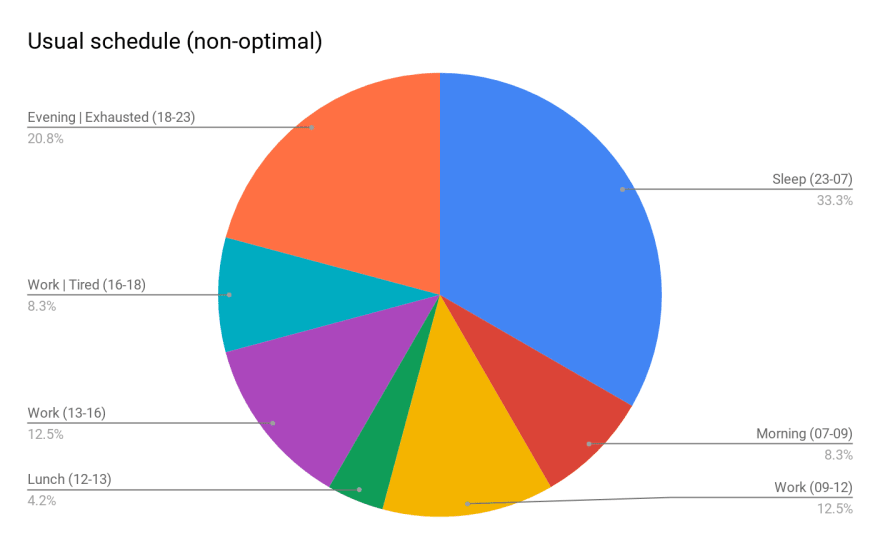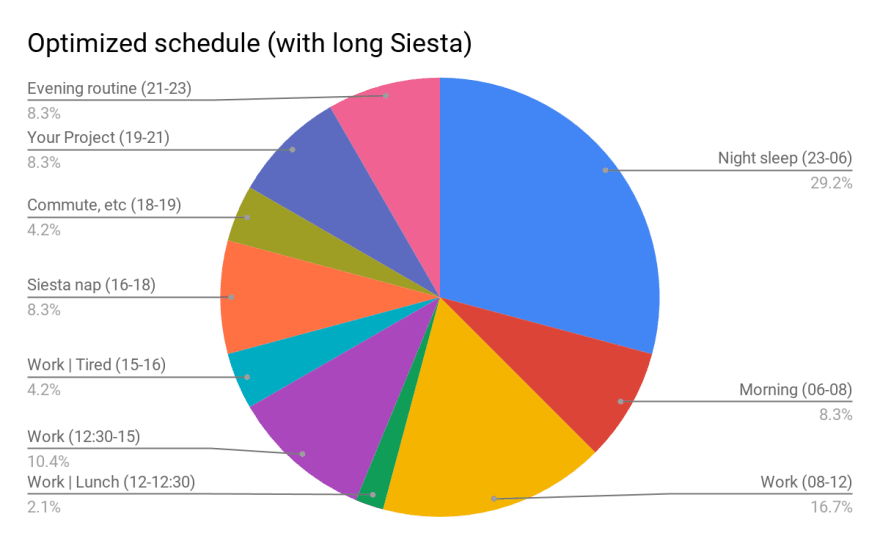This feeling of being utterly exhausted after a full day of work for the employer, with no energy left for your own goals.
You probably can fight this feeling and put in some quality work for a few days, and then crash down with over-exhaustion and not able to do anything in the evening for a month or two.
As you live from paycheck to paycheck, Monday to Friday, wasting every weekend to decompress so that you can run for another workweek for someone else, the feelings of regret are building up.
You start to think that you’ll never be able to accomplish your goal.
I know precisely how that feels. It’s a vicious spiral that, with each day, makes it even less likely for you to do anything useful with your precious hours of “your time.” You could also start over-indulging in various ways to “forget all about” this problem (like passive entertainment, alcohol, meaningless parties, etc.).
Imagine if you could find a way to get a surge of energy and motivation right after work so that you can go ahead and spend 2–3 hours on yourself and your projects. On top of that, it is healthy and doesn’t have any adverse long-term effects.
Wouldn’t that be amazing?
In this article, I’m going to compare two workday schedules: the usual one, most of the 9-to-5(6) workers are living, and a heavily optimized one that lets you have more energy in the evening, after work.
Let’s start by looking at your current schedule (give or take 1h there and there).
Normal (Average) Schedule
Usually, full-time employees work and sleep in the following schedule (add +/- 1 hour in a few places, and you’ll probably get your own):
- 23:00–07:00 Night sleep
- 07:00–09:00 Breakfast, shower, commute, etc.
- 09:00–12:00 Working (for the employer), productively, until lunchtime
- 12:00–13:00 Lunch break
- 13:00–16:00 Working (for the employer), still productive
- 16:00–18:00 Working (for the employer), sluggishly, getting tired and exhausted now
- 18:00–19:00 Commute home, grocery shopping, etc.
- 19:00–22:00 Spending time with the family, and trying to work on something at least for an hour or two, but too exhausted and tired. Watching TV, YouTube, or Netflix instead.
Here is how that would look like in a chart:
As you can see, you start getting tired at the end of the workday, and when you want to put in the quality hours into your own project, you are exhausted.
This time (between 3–6) is actually relatively typical for a human to get drowsy and tired. In the past, people were taking a nap at this time, as their bio-rhythms require so. Even some modern cultures in the world are still doing that. This nap is called Siesta.
Let’s take a look at how we can optimize your schedule to align it with your bio-rhythm and get the most out of your evening “free hours.”
Optimized Schedule For Evening Work
Here is what you can do: remove exclusive lunch (and eat lunch while you work, this way you can be done with your day job one hour early), and add a Siesta (midday nap). You could also start 1 hour earlier to get even one more bonus hour. Here is an example of how you can transform your schedule:
- 23:00–06:00 Night sleep
- 06:00–08:00 Morning routine, commute
- 08:00–12:00 Work productively (for your employer)
- 12:00–12:30 Work (for your employer) & Eat your lunch at the same time
- 12:30–15:00 Work productively (for your employer)
- 15:00–16:00 Work until end of your day (for your employer), getting tired now
- 16:00–18:00 Siesta nap for 90–120 minutes. This is a full sleep cycle, you’re going to wake up refreshed and energized. Just don’t forget to set up a timer for 100 or 110 minutes. Or, better yet, use an app that can wake you up exactly at the end of your sleep cycle. Like this one or that one. This makes waking up super easy, and you feel really well after that.
- 18:00–19:00 Commute home, grocery shopping, etc.
- 19:00–21:00 Deep work time! (on your goals) Not tired anymore
- 21:00–22:00 Spend time with family, do home chores.
Here is how your day will look like visually:
This sleep pattern (and overall schedule) is one of the most optimal for working on your side projects after work in the evening. You can shift hours to your liking to suit yourself, your family, and your employer, of course. The trick is to get a Siesta nap right after work and before putting quality time into your own goals.
Now it’s your turn
With this fantastic schedule, you can slowly and surely chip away at your goal and get there much quicker than you would be able to with the average day job worker’s schedule.
The most significant bit for you now is to stay laser-focused during your free project time in the evening. You can also make your productivity and focus fun with this app.
You just gained this time, don’t waste it by being unfocused!
Now it’s your turn (and your responsibility), go ahead and start making arrangements with your boss and your partner or family to transition into this schedule. Good luck!
Uncage Yourself
I want to help ambitious people like yourself.
The focus is to support you to have the time and energy to work on ambitious goals, become more autonomous and independent in your decisions, work, and life, get recognized by a wider community and attain the freedom that you deserve as a human being.
That’s why I’ve started this publication, “Uncaged You.”
Thank you for reading!
If you liked this article or found it useful, please make sure to leave a comment below with your thoughts on the topic, and share the post on Twitter. You can follow me on Twitter here, as well.
Best of luck with your aspirations! Nathan.
Photo by Rodolfo Clix from Pexels





Top comments (6)
How do you nap before you commute home?
Nap at the office. You don’t have to lie down; it can be done while sitting, make sure your back and the neck are well supported. Anything like a comfortable office chair or a couch (if you have one in your office) would work.
Moreover, you can buy a light, cheap, and compact napping lounger (made out of wood, and cloth) from IKEA or a similar store. Look for something that can be made flat and stashed away between the desk and a wall (so that it doesn’t occupy any significant space in the office, and doesn’t bother people).
I'm going for a 32-hour work-week starting in 2020. Been doing 40 hours for my employer and 20 hours for myself for months now and it's starting to take its toll. That extra 8 hours really should do some magic after a few years :) Will probably be the last time I ever work 40 hours for someone else.
Shorter work-week is pretty good. If only employers were more open to that everywhere.
For those that are morning people like myself, I recommend training yourself to wake up early and doing your personal work before day job work.
My typical schedule is to be up before 5, work out, and then do personal work. While I go to bed earlier, it keeps more free time in the evening to spend with my wife. If she is working that evening, then it's more time to do personal work.
I also try and skip lunch and start work as early as possible in order to circumvent that natural lull in energy during late-afternoon.
Working in the morning, before anybody has woken up, and when you have the most energy, is fantastic! Folk who can do that should incorporate this in their morning routine.